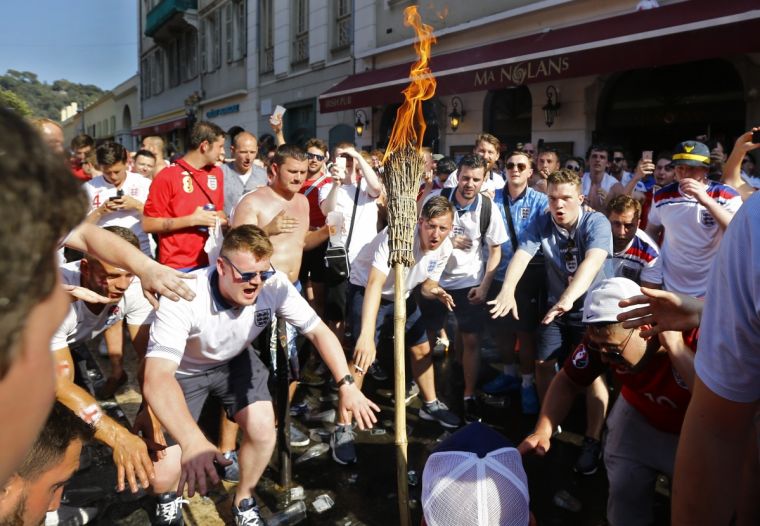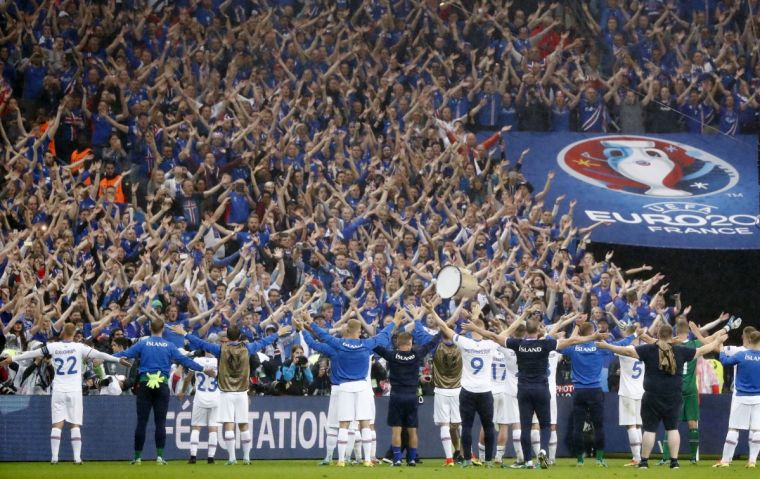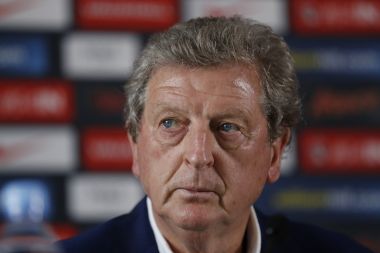5 important deep Spiritual truths we've learned from Euro 2016
At last, Euro 2016 is almost at an end. For football fans that brings the disappointing realisation that you'll no longer need to pull a sickie in order to watch the afternoon game between Switzerland and Albania; for the rest of us, a cause for joy and celebration not seen since Nigel Farage resigned from UKIP. Yet whether you're a football nut or a football widow, there's no denying that the tournament in France has been packed with incident – some of which has even inspired and disturbed onlookers way beyond the sporting fraternity. Here are just a few examples...
Football hooliganism is still an outlet for emptiness and anger

Perhaps the most shocking aspect of the tournament was the resurgence it saw in hooliganism, particularly among Russian fans, but also involving citizens from England, Croatia, the Czech Republic and more. We had collectively hoped that scenes of rampaging, drunken fans in running battles with police were a thing of the past; in fact it's clearly still a current issue for football associations and governments to now address. Thankfully, as the ill-prepared authorities began to clamp down, the violence subsided and the focus returned to matters on the pitch; still there's a huge sense of national embarrassment for certain nations to address; in the context of the EU referendum vote, the shame brought by English fans burns particularly hot.
It's worth reflecting on why fans feel enabled to behave so badly when following their football team overseas. In many cases they're emboldened by the fact that they're gathering in a tribe, far from home, somehow mistaking friendly sporting rivalry for participation in international conflict. For others though football violence simply provides an outlet for their own feelings of frustration and emptiness, so while it might be hard to feel great sympathy for a roaring skinhead on the charge, it's important to remember that their actions are a symptom of wider societal ills. Like criminal gangs, groups of hooligans and ultras enjoy a sense of purpose and community (however misguided) which they're not getting elsewhere. So a crazy but genuine challenge... who's going to start an evangelistic project to reach football thugs?
There's no 'I' in Team (although there are five in 'Individual brilliance')

Oh, England. It's hard to know quite what to say about the miserable performances of Roy Hodgson's men. They weren't the only ones, but Wayne Rooney & Co were a perfect example of how having a group of highly-paid superstars in your team is no guarantee of success. Instead, the tournament was lit up by some extraordinary nations who made up for individual deficiency with organisation, hard graft and tons of team spirit. Wales remarkably reached the Semi Final, despite having a number of unfancied players in key positions; Iceland conquered England and almost beat eventual finalists Portugal even though they draw from a population of 330,000. Even Northern Ireland were plucky enough to get out of their group. Taking Leicester City's Premier-League-winning lead, this was the tournament where the underdog ripped up the form book.
That said, there have been a few outstanding individual performances. Dmitri Payet has emerged as a truly World Class player for France, while at 38, Italy's goalkeeper Gianluigi Buffon rolled back the years with a string of incredible saves. Yet while Bale, Ronaldo and the rest have all had their say, in the end it's teams like Iceland that have won our hearts, with their bizarrely similar surnames and weird slow-clapping crowd chants. Football is a team game, and ultimately we're drawn to players who submit to one another rather than basking in their own glory.
You can demonstrate great leadership by resigning

It's been resignation season across the UK over the last few weeks, so it was no surprise when England's Roy Hodgson fell on his sword all of 30 seconds after the Iceland game. In a hastily written statement, Hodgson remained characteristically integrous, praising his team for their development and accepting full responsibility for their defeat. In a world where other managers seem painfully aware of protecting their own careers, Hodgson's only protective instinct was towards his young charges. Few people disagreed with his decision to resign, but the wording of his departure meant he retained a reputation as a class act.
Jesus wins you matches*
Alright, I'm not going to claim this is actually true. But just as in the final of World Cup 2014, the last remaining teams in Euro 2016 just happen to contain a higher concentration of Christians. At the beginning of the tournament, we highlighted 10 Christian players from across the 24 teams; four are still in it at the semi-final stage. That's not the real story though – Germany contains the highest concentration of Christian players in the whole tournament, with various players including Bastian Schweinsteiger, Lukas Podolski and Manuel Neuer joining those already mentioned; while France too have a number of believers in their ranks including Yohan Cabaye and Patrice Evra. Finalists Portugal meanwhile include a number of practising Catholics, including star man Cristiano Ronaldo, who told the Daily Mirror in 2013 that his faith was "an important priority." Of course God doesn't take sides, but perhaps faith in God – as demonstrated by the two finalists of the 2014 World Cup – and therefore a focus on others, does help players to develop the kind of character which is conducive to team success.
Oh, and if you're going to do your hair...
Don't do it while an opposition midfielder is taking aim at your goal. Turkish midfielder Ozan Tufan probably could have picked a better moment to make sure he was looking his best; he became a subject of Internet ridicule after being spotted lapsing in concentration at the very worst moment... because he's worth it.
Martin Saunders is a Contributing Editor for Christian Today and the Deputy CEO of Youthscape. You can follow him on Twitter: @martinsaunders











